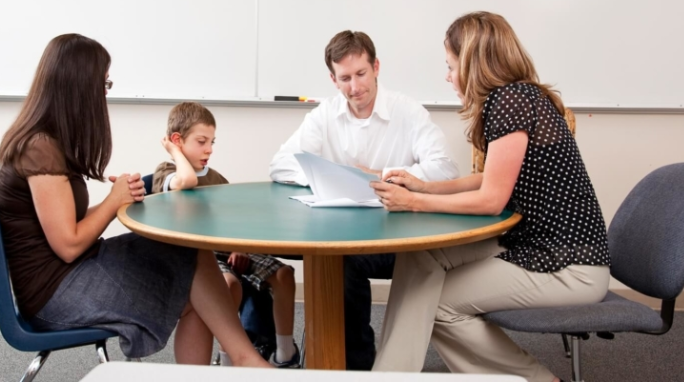How to start the new school year the right way

It may seem obvious but a positive parent-teacher relationship will contribute to your child’s success at school. Whether or not your child struggles with maths, literacy or is starting the journey into high school, resuming school can be a cause of worry for parents and children. Let’s look at some ways which foster a positive approach to working with your child’s teachers.
Communication
In the past, there may have been teachers that your child has loved and teachers that they have not. This goes for parents too – the teachers whom you like and dislike. There are teachers who will really ‘click’ with your child, and those who don’t understand him. In any case, your child’s teacher this year is the second most important person in your son’s life (after his parents!) so effective communication is really important.
Organise a meeting at the start of the school year. This initial meeting lays the groundwork for the entire school year. Let the teacher know that your child enjoys learning but they may need extra help (or extension). Mention that you will provide any extra assistance that the teacher recommends.
** Bring up the topic of homework. It’s very important that you understand the teacher’s expectations so that you can help with assignments precisely. For example, some teachers are happy with parent proofreading, other teachers may want only the child’s attempt. Also, enquire as to the expected amount of time to be spent on homework. Are assignment extensions available? Can they email the teacher for clarification?
Communication throughout the year
Check with the teacher on how best to contact them. Ask, “How is it best for me to ask you a question or follow up?” If you have a concern, request a meeting. Keep in mind that teachers are busy and may have up to 30 children in a class. Turning up before or after school for a quick chat is not the best approach. An organised meeting allows both parties to make a plan to address the concern. After the meeting, be sure to send an email that summarises the main concern to check your understanding and any actions. Remember to thank the teacher for their time and concern.
Organisational Skills
This is a biggie, especially for boys. With younger students, this may mean that you check your child’s desk fortnightly to ensure that they have all equipment. { NOTE: To avoid potential embarrassment for your child, you should do this when few students are around.}
Most schools have websites or apps whereby teachers upload assignments and test dates. Check this daily.
TIP: Make a note of when projects are due and work backwards from those dates. This is particularly important if you have 2 or more children as family stress increases when assignments overlap! If your child’s teacher displays assignments on the classroom wall, ask permission to take a photo at pick up or drop off.
Older pupils may have a locker and it’s often beneficial to buy some cheap magazine racks to help with organisation.
Support or Independent Learning?
School should always be about learning yet students (and schools) are under pressure to get the highest grades. I am often asked, “What will happen if my child fails? How will he or she learn?” Firstly, there is no benefit to allowing a child to fail constantly. One of the best ways that you can support your child is by encouraging them to be an active learner where the focus is on learning the material, not getting a particular grade.
As Daniel Franklin PhD says, “It is more important to prevent a gap in your child’s knowledge from widening than it is to force his or her independence.” As a parent you can support your child by focussing on being a responsible student in these simple ways:
a) putting in a consistent effort
b) completing homework and assignments
c) handing assignments in on time
d) preparing for tests
What a struggling child needs is support, so that they can enjoy success (even the small successes count!). Hopefully, your child’s ability to reach out independently to their teacher will follow with practice and confidence and they will enjoy a rewarding 2020!
Check out our blogs for more ideas and tips.
Six things you can do to get boys reading more
Australia has plunged in global education rankings – the latest PISA results
Boys Love LFB – Here’s what they have to say!
Disengagement: do you think your son switches off in the classroom?
Get boys reading in the digital age
Why write? Tips for reluctant writers
Brought to you by Tanya Grambower
